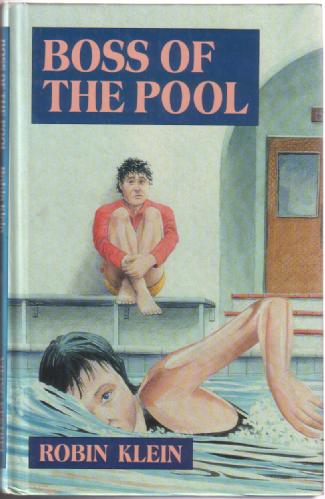1980s Nostalgia: Boss of the Pool by Robin Klein
I bought an old, former school library copy of Boss of the Pool from the Salvation Army Op Shop at Christies Beach for 25 cents recently, thinking that it would make a nice nostalgia post. After all, it is a book that I can remember quite clearly from my primary school years, and is by a renowned Australian author. What I was not expecting was to be quite so moved by it when I revisited the book as an adult.
The novel opens with Shelley, a tough talking and bratty girl who is somewhat reminiscent of some of Klein's other female leads--think Penny Pollard from Penny Pollard's Diary, or Erica "Yuk" Yurken from Hating Alison Ashley. Klein talent is that she writes about kids, especially girls, who are believable. The stars of her novels are never nice, well behaved private school girls. Her characters are ordinary girls from the suburbs (usually Melbourne,) who have hang ups, bad habits and speak back to their parents. In the case of Shelley, she cannot understand why her mother wants to work as an occupational aid at a hostel for intellectually handicapped kids. Shelley is a bit scared of the kids who live there, and she resents the fact that she is made to stay there in the evenings while her mother works. After all, why can't Shelley's mum have a cool job in a record store like the mother of one of Shelley's friends, and why can't they go on holidays to the Gold Coast like some of the other families that Shelley knows? The questions might seem a bit bratty for some adult readers (especially those who like to monitor their children's reading for political correctness,) but they're not unreasonable for an eleven year old kid who grew up in a time and place where people with disabilities were often hidden away from the rest of the community in so-called hostels.
At the hostel, Shelley is befriended by Ben, a lonely teenager with a severe intellectual disability. Shelley loves to swim in the pool, and Ben likes to watch her. He'll never come in the water for fear of drowning. But through a bit of trickery, and a bit of friendship, Shelley convinces Ben that not only is she the boss of the pool and she won't let him drown, but to get in the water. Soon, all of the prejudices that Shelley has about disabilities begin to fade and she learns some valuable life lesson.
Although very dated--this one uses language that wouldn't be publishable in a children's book today, though the terms were common and considered acceptable at the time, this one is a well-written and moving tale about acceptance for children and one that a lot of adults could probably benefit from reading. The thing about Shelley is that she's not perfect, and some of the tricks she plays on Ben aren't very nice, but ultimately, she is able to reach him in a way that no one who works at the home can. And it's debatable whether Ben really believes all the lies that Shelley tells (at one stage, she tells him that all of the players on his favourite football team have been in this pool,) or if it's really just the push that he badly needs. There is also an undercurrent through the book about how we treat children who are disabled--apparently Ben's parents rarely visit.
Recommended.



Comments